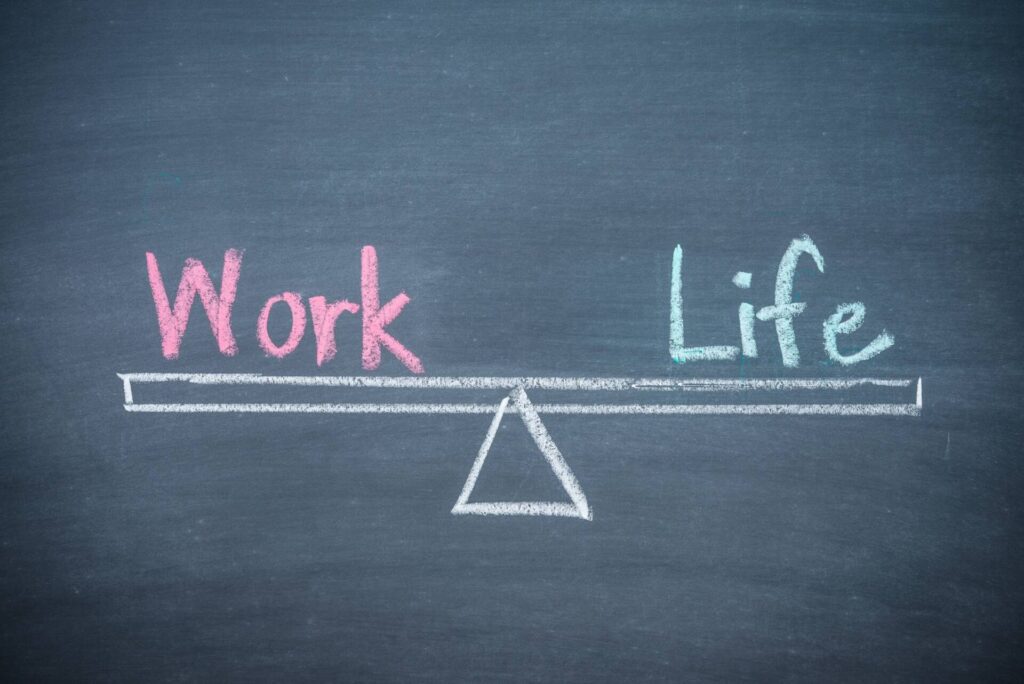Work-life balance is an important part of maintaining your personal well-being, productivity, and mental health. It helps to prevent burnout at work and ensures you’re able to meet your personal obligations.
Being overwhelmed at work can lead to dropping standards which may affect your overall productivity levels and lead to a disciplinary. Maintaining a good work-life balance helps to keep you happy and motivated and stops work from taking over your life. It’s key to boosting overall productivity and supporting long-term happiness inside and out of the workplace.
In this article, we discuss what is work-life balance and count down 10 tips for creating a good work-life balance, so if you’re feeling overwhelmed by work, put these into action.
What is work-life balance?
Work-life balance is a general term given to a healthy divide between work responsibilities and personal life. Essentially, it’s about stopping work from taking over everything else, allowing space for things like family time, hobbies, relaxation, and personal interests.
Achieving this balance is not always easy depending on the pressures of your work. It’s also gotten harder in recent years as the lines between work and home have been blurred with remote and hybrid work. When work emails can ping on our phones at any hour, or meetings fill the day, drawing a line in the sand and prioritising time for personal life is more important than ever.
Why is work-life balance important?
When we feel balanced, it’s easier to manage stress, which leads to a better mood and more energy. This balance is also closely tied to job satisfaction and productivity: employees who can keep work in check are more motivated, less likely to burn out, can focus on their career advancement, and are generally happier in their roles.
It’s easy to see how this benefits both the employee and their organisations. Employees who feel supported in managing their personal lives are more engaged, efficient, and loyal. This balance promotes a positive work culture, where both individuals and the organisation benefit — happy, balanced employees bring value, creativity, and dedication to their roles, making work-life balance a win-win for everyone involved.
Finding work that understands and promotes a healthy work-life balance is key to a lasting career. Check the Recruit Ireland job board to see the work-life balance policy at different businesses to find your perfect role.
10 practical tips to maintain a healthy work-life balance
Balancing work and personal life can be tricky, but creating small, intentional habits can make a big difference. Here are some effective tips to help you achieve a healthier balance.
Tip 1: Set clear boundaries between work and personal life
Setting boundaries is one of the best ways to protect your time. With remote and hybrid work, it’s easy for work tasks to spill over into home life. Start by maintaining clear working hours and communicate these hours to your team. For instance, if your workday ends at 6 p.m., make it a habit to turn off work notifications after that time.
Setting these boundaries allows you to fully disconnect after hours, making it easier to recharge and return to work feeling refreshed the next day.
Tip 2: Prioritise self-care
Simple self-care routines like regular exercise, quality sleep, and short breaks throughout the day can make a huge difference. Exercise doesn’t have to be strenuous; even a short daily walk can boost your mood and reduce stress.
Quality sleep is one of the single most important things we can do for ourselves. It provides mental clarity and energy, so aim for a consistent sleep schedule. During the workday, schedule small breaks to step away from the computer, stretch, or practice mindfulness. These moments recharge you, making it easier to tackle work without feeling drained.
Tip 3: Make use of hybrid work opportunities
Hybrid work makes it easier for you to structure your workdays in a way that supports both productivity and personal needs. For example, you might choose to work from home on days that require deep focus and head into the office for collaborative tasks.
Alternatively, using hybrid flexibility to balance your day — such as starting work earlier to finish before evening commitments — can also help. Hybrid work needs to be carefully balanced, as inviting work into your home can prevent you from properly clocking off. The key is to find a routine that maximises your productivity without sacrificing time for yourself and your loved ones.
Tip 4: Practice time management
Start by using scheduling tools, like a calendar app or project management software, to organise your tasks. Set daily priorities and make a habit of tackling the most important items first. Breaking larger tasks into smaller steps also makes them feel more manageable and allows you to see progress throughout the day.
Tip 5: Disconnect from work after hours
Turn off notifications on your devices or set “Do Not Disturb” modes for evenings and weekends. Logging out of work accounts and creating a clear mental and physical boundary between work and personal time — like using a separate workspace or setting an “end-of-day” ritual — can also be very effective.
Tip 6: Learn to say no
Saying no is an essential skill to learn in life. “No” is a full sentence and helps to keep the employee’s work-life balance safe. Taking on extra tasks can be tempting, but setting limits is necessary to avoid burnout. Politely decline additional work when it interferes with your personal time, or suggest a realistic timeline if it needs to be postponed.
Tip 7: Use your vacation days
Taking time off isn’t just a luxury — it’s necessary for recharging both mentally and physically. When you use your vacation days, you return to work with a fresh outlook, renewed energy, and often greater motivation. Try to plan regular breaks throughout the year, even if they’re short, to maintain perspective and prevent burnout.
Tip 8: Create a healthy work environment
Your work environment has a big impact on your productivity and mental state. Design your workspace in a way that promotes comfort and focus. Ergonomic furniture can help reduce physical strain, while good lighting keeps you alert and reduces eye fatigue.
Keeping your desk tidy and organised also helps reduce mental clutter, allowing you to focus better. A workspace that feels comfortable and naturally “you” makes it easier to work effectively and enjoyably, reducing stress throughout the day.
Tip 9: Focus on stress management
Stress is inevitable, but learning to manage it makes a huge difference in achieving work-life balance. Introduce simple stress management techniques like mindfulness, breathing exercises, or short meditation breaks into your day. These practices can help you stay calm, focused, and in control, especially when you’re feeling too busy at work.
Tip 10: Build a support network
Having a strong support network of family, friends, and colleagues is invaluable. Whether it’s sharing challenges, seeking advice, or simply spending time with loved ones, a solid support system helps you feel understood and supported.
Lean on your support network during tough times, and don’t hesitate to ask for help when needed. Knowing you have people who can help you navigate work and life challenges makes it easier to stay motivated and maintain a healthy balance.
Work-life balance and the Work-Life Balance Act 2023
The Work Life Balance and Miscellaneous Provisions Act 2023 provides greater flexibility and support for employees in Ireland seeking a better work-life balance. This Act allows employees to request flexible or remote working arrangements, such as adjusted work hours or remote work options, especially for those with caregiving responsibilities. Employers must consider these requests fairly and respond in writing if a request is denied, helping create more transparent and flexible work environments.
How to integrate work-life balance into your daily routine
Creating a balanced routine doesn’t have to mean big changes; it’s about small, consistent adjustments that support your well-being. Here is a short list of things to help you get started:
- End-of-day routine: Logging off at a specified time, tidying your workspace, or setting an out-of-office reply.
- Mindfulness breaks: Allow yourself to recharge during the day with a simple breathing exercise.
- Define boundaries between work and home life: If working remotely, designate a working zone and don’t allow it to spill over to relaxation zones.
- Make time for family and hobbies: Ensure you have enough “me time” to allow you to properly disconnect from the pressures of work.
- Become your own boss: Starting your own business or becoming a freelancer can enable you to have far greater control over your work/life balance.
Over time, these habits will feel natural, helping you maintain balance without major effort.
Common challenges in achieving work-life balance
Achieving work-life balance may be a challenge at first, especially if you’re engaged in remote or hybrid working. Many people find it difficult to “switch off” due to the expectation of constant availability. So it’s really important to communicate clear boundaries with your work colleagues so everyone has the same expectations.
A great way to make sure you’re using your available time more effectively is by using time-management tools, such as a daily planner or a task management app, which can also keep you focused and organised, making it easier to separate work tasks from personal time.
Finally, don’t hesitate to talk with your supervisor about workload and expectations if you’re feeling stretched. A quick conversation can often lead to adjustments that support both your productivity and well-being.
Take control of your work-life balance today
The first step in taking back control of your work-life balance is choosing a company that understands and respects this. On Recruit Ireland’s job board, you can explore numerous positions across Ireland that emphasise work-life balance, including many flexible, remote, and hybrid roles.
If you’re looking to refresh your CV or improve your interview skills, the Recruit Ireland Advice Centre has you covered. Check out guides on workplace success and upskilling to prepare yourself for these roles. Small, proactive steps can lead to a more balanced, fulfilling work life — why not start today?










